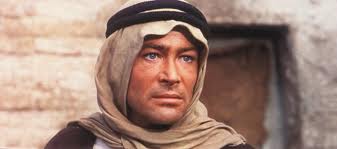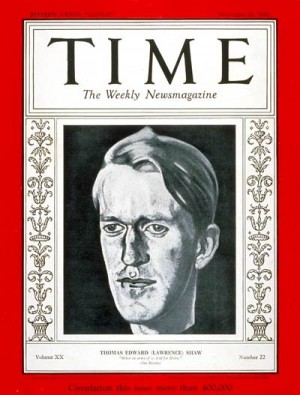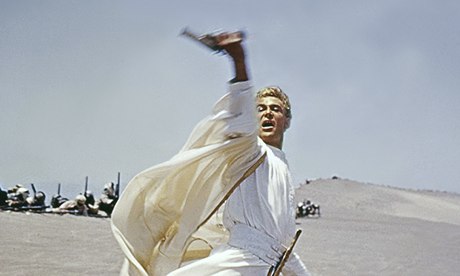

 There is no immortality in this life, not in a universe of 200 to 500 billion galaxies*, each with billions of its own stars, every one of them in its own state of flux, coalescing out of gases or blowing up in solar system sized explosions, and not on a planet where mountain chains wear down to nubs and continents slide tectonically around the surface of the earth like eggs in a greased skillet, but since we all must go down, how wonderful to leave behind this temporary incarnation — to live beyond one’s allotted years in images on film, especially in an extraordinary film, your heroic gestures 20 feet high and forever preserved in the pure, sharp summit of your brilliant youth. Peter O’Toole is gone, but El Aurens, his Lawrence, will be with us for a very long time. Peter O’Toole died this past Saturday at 81. He loved plays more than movies, and he performed in many of both, but he will be remembered for his portrayal of T.E. Lawrence** in Lawrence of Arabia.
There is no immortality in this life, not in a universe of 200 to 500 billion galaxies*, each with billions of its own stars, every one of them in its own state of flux, coalescing out of gases or blowing up in solar system sized explosions, and not on a planet where mountain chains wear down to nubs and continents slide tectonically around the surface of the earth like eggs in a greased skillet, but since we all must go down, how wonderful to leave behind this temporary incarnation — to live beyond one’s allotted years in images on film, especially in an extraordinary film, your heroic gestures 20 feet high and forever preserved in the pure, sharp summit of your brilliant youth. Peter O’Toole is gone, but El Aurens, his Lawrence, will be with us for a very long time. Peter O’Toole died this past Saturday at 81. He loved plays more than movies, and he performed in many of both, but he will be remembered for his portrayal of T.E. Lawrence** in Lawrence of Arabia.
In later years he regretted the toll taken on his abilities by the making of the movie. He said that he had spent “two years and three months thinking about nothing but Lawrence,” and that it was “painful seeing it there on the screen, solidified, embalmed.” He much preferred acting on stage, where he loved what he called “the art of the moment,” the actor’s lightning-quick insight that flashes into his or her character on that evening alone and then forever vanishes. Richard Burton^*, who regularly blew up any pretentions about ac-tors and ac-ting, said that “acting is usually regarded as a craft, and [it is] nothing more except in the hands of the few … who once or twice in a lifetime elevate it into something odd and mystical and deeply disturbing.” ^^
Watch O’Toole in Lawrence and his performance at first seems both dazzling and opaque as if you were looking at an actor who gave you nothing but faceted, icy surfaces. But as is so often true in our encounters with others in life, the script never gives him speeches where he delivers explanations of his motives that allow us to see inside him, to ‘understand’ him. Instead O’Toole gives us a Lawrence who is defined almost purely by his actions, whose risk taking and physical toughness and bravery are wrapped up in a furious drive to test his will so as ‘not to mind’ the pain, any pain, any obstacle, that might place itself in front of his body as he pursues his purposes. He never explains where that drive originates or why it is so important to him. Only as he takes action do we receive any hint as to what he believes, and then we have to guess at the answers to those questions in his gestures, and in the expressions on that wondrous face in his close-ups. Burton’s reference to something odd, mystical and disturbing in O’Toole’s portrayal is spot on — in his version of T. E. Lawrence he caught the essential unknown that exists in each of us, that raft of secret selves that we have waiting somewhere deep if we ever need to call upon them. O’Toole’s Lawrence had more cause than most to call on many of those selves. He seems continually surprised as each new persona makes its appearance. He does not have complete control of them. If fact, sometimes, he is barely hanging on to any control at all. In becoming Lawrence, O’Toole dismissed the idea of a linear, defined, coherent personality. He seems to suggest this – isolated and under the insane pressure of combat, we have no idea who will emerge from inside us.
The deepest pleasure of movies comes not from spectacle or from the latest technological whiz-bang, but from the ability of great actors and actresses to tie their performances into our yearning for the release of those alternative lives we carry within. No, what most of us want is someone to show us those others we want to believe dwell within us, the Romantic, the Heroic, the Resolute, or the Resilient ones — Bogart’s Rick Blaine, Weaver’s Ellen Ripley, Peck’s Atticus Finch, Foster’s Clarice Sterling. Those authentic performances enter us, and some go so far in that they leave imprints — trace signs that our close friends can sometimes read in our words or intonations or in the way we enter a room or grow quiet in a crisis.
I would like to believe that I have some part of Lawrence within. I cannot be alone in this faithful hope set in me by movies. When we enter those screens, we come with requests — open me up to someone I did not know that I possessed, illuminate my nobility (or my villainy), give me a context where I can watch my shadowed identities come to life. These seem so close to prayers. We want so much to go on, to be renewed, and to be watched as we calmly release a lover to a better life, rescue a child from a monster, face down a mob, confront the devil, or ride across sand dunes into battle. We are all fantasists, every one of us, and Peter O’Toole knew that.
* http://www.universetoday.com/30305/
** http://www.spartacus.schoolnet.co.uk/IRQlawrence.htm
^* http://www.nytimes.com/learning/general/onthisday/bday/1110.html